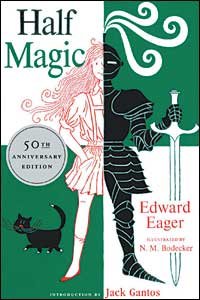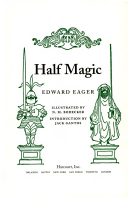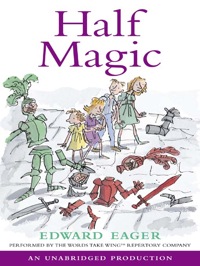This week, in the children’s department of the library where I work, I picked up a book called Half Magic, by Edward Eager, with the idea of putting it on the staff recommendations table. It is a book about the comic adventures of some children who find a magic coin, but always get (unpredictably but exactly) half the magic they wish for. It was published in 1954, and I loved it as a kid in the early 1970s.
I opened it up randomly at a section where one of the children has wished that they could travel to a desert island, but the children end up in a desert, instead. Yikes! I instantly wished I hadn’t opened it, because the children meet a ragged, “crafty, and definitely unattractive” Arab named Achmed who smiles unpleasantly at them. Achmed is evidently Muslim, as he says “Bismillah!” in greeting.
One child says “How!” to him in return, and another child says to the first, “What do you think he is, an Indian?” (If you are younger than I am, you might not know that back in the 20th century we non-Native Americans believed this was something Native Americans said instead of hello. Which Native Americans? I have no idea.)
“Allee same show humble servant nearest oasis chop-chop?” the second child says to Achmed, and the third child says “He won’t understand that, either–that’s Chinese!”
That was Native American and Asian gibberish, explicitly labeled as Indian and Chinese, so it’s not like it would sail over kids’ heads. All of this was within a few short paragraphs: a trifecta of disturbing and profoundly “othering” stereotypes.
When I turned the page there was Achmed in the illustration with his camels and his huge, hooked nose, “planning and plotting wickedness”–to kidnap the children. When the children make a wish for him (to make him happy so he won’t want to kidnap them anymore), he is so grateful that he “turned toward the East and fell on his face in the sand. His voice lifted in what sounded like a prayer of thanksgiving.”
So, I have got to confess I am torn when it comes to troubling things in older, children’s literature. I am mostly good with the “having the conversation with children” approach to troubling passages/ideas/language in children’s books. That’s especially the case with important historical books like Little House on the Prairie, in which the westward migration by white settlers and what it meant for Native Americans is an important part of the book. And Adventures of Huckleberry Finn–slavery and racism and the rights of human beings are a huge part of what this book is about (both explicitly and implicitly)! (Twain was anti-slavery and hated how his mother’s brand of Christianity suppressed her natural empathy and humanism, and caused her to believe black people should be enslaved. That essay in which he discusses this would be a good pairing with a discussion of Huck Finn.) So yes, this stuff is meaty and historical and eye-opening conversations can naturally flow from content–and that stuff has to be put explicitly on the table for discussion when dealing with the books.
(Admittedly, that’s in theory, though: how comfortable would I feel about discussing Little House on the Prairie‘s depiction of Native Americans in a class with Native American kids in it? How well would I handle a class discussion about Huckleberry Finn, with its use of the “n-word,” with African American kids? I’ve had these conversations with my own kids, but I am not a classroom teacher, and I can feel the risks and pitfalls of handling something so sensitive insensitively or clumsily, and potentially insulting or traumatizing a student. I can still remember my well-intentioned middle school social studies teacher, in our Vietnam War unit, telling our class about Vietnamese women of that era having eyelid surgery in order to have more Caucasian-type eyes, and saying earnestly how they shouldn’t have because there was nothing wrong with the natural shape of their eyes–and everyone in my class turning around to stare at me, as the only Asian person in the class. I was mortified, as it had never actually occurred to me before that very moment there could be anything wrong with the shape of my eyes. Thanks, teacher! So, good intentions are not enough. Actual skills and sensitivity are needed, too.)
Most of us are not expecting to have to be wary of this sort of thing in a lighthearted, fluffy comic romp for kids from 3rd-5th grade (though we should be, for anything written before, say, the 1970s or even later). So adults are not on the lookout to have those conversations with kids stemming from these books; and this sort of horrifying casual racism tends to go unobserved by adults and therefore unremarked.
Another thing: there’s no real point to the stereotypes in books and passages like these except entertainment. So should those of us on the receiving end of this casual racism just “take the joke”? As someone who grew up having those garbled mock-Asian words and “do you eat dog?” and “go back to your own country” (etc.) comments directed at me (and yes, witnessing someone say “no tickee, no washee” and “chop chop” to my mother–in the late 1980s, no less), that’s painful. Think it doesn’t happen now? I had an elementary school child say some of those things to me (an adult!) just a couple of years ago.
We have Asian and Muslim kids (both immigrants and raised here), as well as Native American kids, who are patrons in our library. What are they supposed to make of these passages? What messages are they supposed to absorb, given the tacit approval the books have by being in our library for them to read (and in the case of Half Magic, on recommended reading lists in our catalog: “If You Like Harry Potter” and “If you Like Magic Tree House, Try These” as well as 45 others listed in the side bar)? What messages are all the kids, including the mainstream ones, getting? Are immigrant parents (who may not be fluent in English or might not have the cultural context to understand the particular form of racism) supposed to understand these passages and help their kids work through them?
The same goes for all those older children’s books that are casually racist toward Hispanics, or black people (American or not), or any other minority. I can’t quite stay on board with leaving those on our shelves, knowing that a child may open one of those books and feel, like I did, punched in the heart; or even that a dominant culture kid might read it and feel those stereotypes are ok. In the early 1970s, when I read Half Magic, that kind of casual racism was endemic. But this is 2016, and we should be doing better.
I get that “the past is a foreign country, and they do things differently there.” But how much of the reason we keep these books is because they are really that good (the “classics” argument), and how much of it is because we are simply nostalgic?
I’m going to quote someone named Philip Nel here, from the comments section of a post called “Surprise! It’s Racist! Unwanted Children’s Book Surprises” (which I found while trying to think my way through this:
“It’s really important that readers recognize the racism in Seuss, Dahl, Travers, de Brunhoff, & all the rest. It’s equally important that people not just dismiss it as ‘oh, those were different times’ or say ‘don’t apply current standards to books from then.’ In 1950, people of African and Asian descent were just as human as they are now.”
I am writing this hopefully as part of a conversation, and not as a diatribe (though I’m aware this may unfortunately come across as ranty). I am trying to work my way through these feelings and ideas as much as anyone else. I don’t at this moment have a specific recommendation for Half Magic (which is delightful except when it’s horrifying). I’m not in favor of banning books. But books like this tend to sail under the radar. Because it’s meant to be funny, it’s kind of more insidious: like Amos and Andy, or white actor Mickey Rooney playing a Japanese man in Breakfast at Tiffany’s, or the limp-wristed, mincing, swishy comic depictions of gay men on television in the 1970s and 1980s. That’s when you get people defending bigotry on the grounds of humor.
I am a librarian, and that means I don’t believe in banning books or removing access to information. I’ve warned adult patrons looking to do read-alouds to children before, though, when they are looking at older titles that are problematic because of outdated and quite possibly offensive content or language. Likely I’ll come down on the side of, at the very least, removing the book from my library’s recommended reading list(s). What do you think, readers?




This is an interesting situation you find yourself in. If you were using the book in a classroom setting, you could have conversations about the issues you identified. But what do you do in a library setting when you know these books exist? A few things come to mind:
(a) you don’t have to put the books on display, but you know they exist. it’s up to the people who read them to decide how they handle it
(b) you do put the book on display, but you identify other texts that have the same issue. you turn it into a display where you point out the issues and potential problems with these books; use it as an educational experience and as a way to see how our understandings and beliefs have (or maybe haven’t! evolved over time
LikeLiked by 1 person
Thanks for commenting, Leigh! Your suggestions both seem quite feasible to me, but with regard to (a), when you say “it’s up to the people who read them to decide how they handle it,” would you feel comfortable if those people are 8-10 year olds who are reading the books independently–not being read to by their parents?
For (b), displaying the books while pointing out their issues, it seems to me that in a public or even a school library you would have to be ready for a possibly considerable amount of pushback by adults who are quite nostalgic about those books and would quite likely accuse you of “censorship,” excessive “political correctness,” and probably worse. I’m not saying it’s not worth fighting the good fight; but I do think you’d have to be prepared for that.
LikeLiked by 1 person
Good point regarding the first idea. Even the most involved parent cannot be up on ever issue in every book their child reads. So I think that if you think we should not ban books (agreed), then you have to be ok with a kid checking out this book and potentially coming across these ideas without any guidance or help in thinking them through.
LikeLike
I like both the solutions you present above. It occurred to me that they can become teaching tools, like the display and collection of books. I see this phenomenon a lot when watching retro tv shows from the 50’s, 60’s, and 70’s, (e.g., racism and sexism that were considered acceptable at the time). These are tough dilemmas for librarians.
LikeLiked by 1 person
Hi Peggy–thanks for your comment! I like the idea of using them as teaching tools, too, but as I mentioned to Leigh, above, I think we’d have to be prepared for some pushback by adults who remember the books fondly. I encountered this recently while discussing the issue with a few friends, a retired children’s librarian and a semi-retired children’s book author.
The children’s book author, a dear friend who is a generation older than I am, is very much against bowdlerizing, altering, or rewriting problematic passages in older children’s books–but also said that she had a very uncomfortable time during a read-aloud to children when she realized that a Kipling “Just-So” story she had selected (and had very fond memories of) was not at all acceptable by today’s standards, including her own, for children.
I think part of why we want to share certain books with our children is the transmission of our personal and cultural heritage; we want them to know and love the things we loved when we were young. It feels like a part of us is passing away into irrelevance and oblivion if the next generation doesn’t share those experiences and memories. That is one reason why the issue is so fraught, even for those of us who are not politically conservative. But just as you mentioned, watching old tv shows brings the ways our beliefs have changed into consciousness, too.
The political reason for keeping things the way they are is a whole ‘nother thing.
LikeLike
What a great and timely post! While kids deserve the chance to choose what they read and banning books is silliness, I think that finding a balance between what kids want and what could potentially be a problematic book is essential. I think that knowing your students/patrons is the most important aspect to helping them choose amazing books that they’ll love. That said, it’s important that librarians and teachers have access to good reviews as well as continue to read so that they have a good idea of what’s out there. And, as we’ve learned, recommended reading lists are well used by students and parents-maybe to a fault! So making sure that are thoroughly vetted is a good place to start if we can’t catch every reader and give personal recommendations for amazing book choices.
LikeLiked by 1 person
This is certainly a predicament that you find yourself in. Thank you for sharing this story! I agree that children deserve a chance to choose what books they would like tor read without fear of banned books or limits to the knowledge that they can have access too. However, this is a really tricky situation. What topics are too difficult to just talk about? I also really found it interesting what you brought up about some parents potentially lacking the cultural knowledge to understand racism within texts, such a great and unnoticed thought!
LikeLiked by 1 person
Hi Sydney! Thanks for your comment! Here is the tl;dr version of my long reply below: many parents would be shocked to know what prejudices their kids absorb from all around them, including classic books. We can’t address messages we don’t know they are receiving; and ignoring those biased messages as though they don’t exist doesn’t work, either.
When my son was in preschool, he watched the Disney animated version of Peter Pan and listened to an audiotape of the book. Afterward, he said to me, “I don’t like dark-skins, I like light-skins like us!” Even though he didn’t have the usual terminology, he meant that he liked and identified with the white characters (Peter and the Lost Boys, Wendy and her siblings), and disliked the Indians (Tiger Lily’s tribe). Oof–that really got to me! It was an educational moment for both of us. I’m glad he made the comment to me, as awful as it was to hear (and as much as it made me feel I had failed as a parent), because that gave me a chance to talk about race and prejudice with him.
What worries me more are all the stereotypes about minorities that our kids (both mainstream and minority) absorb yet do not reveal to us. It is difficult to address what we don’t know about. If my son had not made that comment to me, I would not have known that was what he was thinking. Although I already knew that the image of Native Americans in Peter Pan was outdated and problematic, I had kind of hoped its significance would sail over his head. That was wishful thinking on my part.
And as someone who works with and around children, I overhear things from them that many parents would be shocked to hear–racial, religious, and homophobic insults and slurs most well-intentioned parents would not dream their children know. Most kids know enough to conceal those words and ideas from their parents, because it is a taboo subject: for lots of well-intentioned adult people, explicit talking about race and other issues with young children seems too difficult and ugly. We hope that our children will remain magically untouched by prejudice, but it doesn’t work that way.
LikeLike